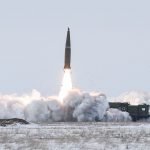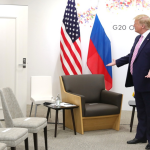OPINIONS
Date: 13 August 2019
INF’s Demise is Russia’s Defeat
The United States officially pulled out of the Intermediate-Range Nuclear Forces (INF) Treaty. While announcing Washington’s ultimate decision, U.S. Secretary of State Mike Pompeo accused Moscow of having violated the deal. Naturally, Moscow claims the United States is to be blamed for the end of the landmark agreement, a statement that was followed by Russia’s formal exit.

The U.S. pullout of the treaty took effect on August 2 after the expiry of its six-month notice of withdrawal due to Russia’s noncompliance of the landmark disarmament deal. The INF is an obsolete treaty. The pact does not take into account the current state of military confrontation between Russia and the West nor does it include how nuclear weapons have developed worldwide over the past thirty years. It also neglects the fact that a large group of countries that are not covered by the pact has in their nuclear stockpile medium-range missiles. Among such states is China, whose nuclear arsenal keeps posing a threat to the United States and its Asian allies. While bringing the matters of INF compliance to a head, Washington felt inspired by two significant motives. First, it could no longer give the nod to being the only side to comply with the treaty while the other party, seen as a severe threat to U.S. security, breaches the provisions of the deal while making attempts to construct a forbidden nuclear weapon. Secondly, from Washington’s point of view, any mechanism to limit further development of medium-range weapons will make sense only if it includes China within its scope.
Support Us
If content prepared by Warsaw Institute team is useful for you, please support our actions. Donations from private persons are necessary for the continuation of our mission.
Russia tore up the treaty
The Intermediate-Range Nuclear Forces Treaty (INF) was signed in Washington by U.S. President Ronald Reagan and Soviet leader Mikhail Gorbachev in 1987. The agreement provided for liquidating intermediate-range ballistic missiles and medium-range missiles while banning both countries from developing, producing, and deploying missiles with ranges between 500 and 5,500 kilometers. Importantly, the treaty barred Washington and Moscow from having ground-launched intermediate-range weapons. However, it did not refer to the U.S. Navy’s sea-launched Tomahawk missiles or Russian-made air-launched Kh-55 cruise missiles. By 1991, parties to the treaty dismantled their nuclear stockpiles and later observed the agreement’s provisions. With the fall of the Soviet Union, Russia took over its obligations under the deal and managed to observe the treaty under Yeltsin’s rule. But this changed after Vladimir Putin came to power. As informed, Russia kicked off the development of a prohibited weapon at least in 2007, with first missiles being test-launched a year later. Although the U.S. intelligence service found out Russia’s attempts, the Obama administration failed to informed the Congress. Barack Obama, who at that time sought a reset in relations with Russia, did not disclose Moscow’s noncompliance with the agreement until 2014. Washington and NATO repeatedly called on the Kremlin to return to compliance, but their efforts were in vain, though. Russia has successfully deployed its prohibited Novator 9M729 missiles to at least four battalions located mainly in the European part of the country.
In October 2018, U.S. President Donald Trump publicly stated the Kremlin’s noncompliance to the INF Treaty, announcing his intention to exit the pact, in the face of Washington’s unilateral abidance. In early February, U.S. Secretary of State Mike Pompeo said that Washington would quit the agreement after the expiry of six-month notice of withdrawal unless Russia returned to full compliance and destroyed all weapons it had produced until then. The Kremlin failed to take actions, and Russia began accusing the United States of having been in breach of the treaty, as evidenced by launching U.S.-made anti-missile defense shield in Romania and Poland. The Kremlin hoped to sow discord between the United States and its European allies. It was the opposite of that. NATO stands firmly to back Trump’s INF-related steps. „Russia bears sole responsibility for the demise of the treaty; a situation whereby the United States fully abides by the Treaty, and Russia does not, is not sustainable; NATO will respond to the risks posed by the Russian missiles,” the North Atlantic Council said in a statement published on August 2.
NEWSLETTER
Arms race? West will win
„Today the INF Treaty ceases to exist because Russia has deployed the SSC-8 missile system. The new Russian missiles are nuclear-capable, mobile and hard to detect, they can reach European cities within minutes of warning time. This lowers the threshold for the use of nuclear weapons in armed conflict,” NATO Secretary General Jens Stoltenberg said. He stressed that Russia continues to develop and field the systems, despite years of engagement and calls by the United States and European countries. While commenting on the matter, Moscow is using the diplomacy of lies. Just as it lied while claiming Washington to be blamed for the INF’s demise (because the United States was the first to announce its withdrawal from the pact), Russia is now making an outstanding example of hypocrisy, as was shown by its proposal to sign a moratorium on the deployment of short and intermediate-range missiles to Europe. As NATO Secretary-General Jens Stoltenberg briefly summed up the situation, „there is zero credibility in offering a moratorium on missiles they are already developing (…). There are no new U.S. missiles, no new NATO missiles in Europe. But there are more and new Russian missiles.” The outcomes of Putin’s policy were also aptly resumed by new British Foreign Secretary Dominic Raab who said that Russia’s „contempt for the rules-based international system threatens European security.”
The Kremlin, for its part, has reiterated that Trump’s decision is likely to accelerate a downward spiral into the arms race and lowering the security threshold in a potential nuclear conflict. Russian Deputy Foreign Minister Sergei Ryabkov claimed „Russia will never lose the arms race.” This is either Russian officials’ optimism and a strategy of putting on a brave face or a proof of stupidity of the Russian authorities. The present situation resembles that of the 1980s when Moscow staged the arms race by fielding in Europe its nuclear-tipped medium-range missiles. In response, Reagan and U.S. European allies deployed Pershing and Tomahawk missiles. The Soviet Union was no longer capable of handling competition from the outside. The INF Treaty was signed, followed a few years later by the collapse of the Soviet Union. If Washington develops its medium-range missiles, it will soon surpass Moscow’s nuclear achievements. Naturally, Moscow hopes that Europe will not admit U.S.-made missiles to its soil, fearing Russia’s ire. This may be the case of Germany or Benelux countries, or that of France and Italy, but certainly not Eastern Europe. The United States has real allies there, with Poland at the helm, that see fielding weapons in terms of a triple benefit. First, this will bolster their alliance with Washington. Secondly, such a step will solidify their position in Europe, NATO, and the European Union. Thirdly, and most importantly, this military partnership will boost security in the face of Moscow’s belligerent plans.
Author:
Grzegorz Kuczyński – graduate in history at the University of Bialystok and specialized Eastern studies at the University of Warsaw. He is an expert on eastern affairs. He worked as a journalist and analyst for many years. He is the author of many books and publications on the inside scoop of Russian politics.
_________________________________
All texts published by the Warsaw Institute Foundation may be disseminated on the condition that their origin is credited. Images may not be used without permission.















